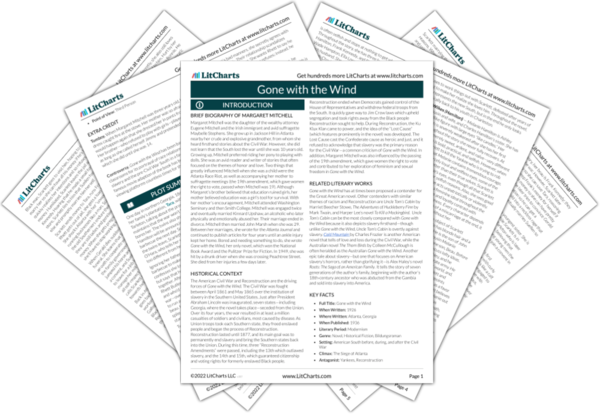Ellen O’Hara Quotes in Gone with the Wind
Chapter 3 Quotes
It was a man’s world, and she accepted it as such. The man owned the property, and the woman managed it. The man took the credit for the management, and the woman praised his cleverness.
Chapter 8 Quotes
There was something exciting about this town with its narrow muddy streets, lying among rolling red hills, something raw and crude that appealed to the rawness and crudeness underlying the fine veneer that Ellen and Mammy had given her. She suddenly felt that this was where she belonged, not in serene and quiet old cities, flat beside yellow waters.
Chapter 25 Quotes
Something that was youth and beauty and potential tenderness had gone out of her face forever. What was past was past. Those who were dead were dead. The lazy luxury of the old days was gone, never to return. […] There was no going back and she was going forward.
Throughout the South for fifty years there would be bitter-eyed women who looked backward, to dead times, to dead men, evoking memories that hurt and were futile, bearing poverty with bitter pride because they had those memories. But Scarlett was never to look back.
Nothing her mother had taught her was of any value whatsoever now and Scarlett’s heart was sore and puzzled. It did not occur to her that Ellen had could not have foreseen the collapse of the civilization in which she raised her daughters, […] that Ellen looked down a vista of placid future years, all like the uneventful years of her own life, when she had taught her to be gentle and gracious, honorable and kind, modest and truthful.
Chapter 35 Quotes
No matter what sights they had seen, what menial tasks they had done and would have to do, they remained ladies and gentlemen, royalty in exile—bitter, aloof, incurious, kind to one another, diamond hard. […] The old days had gone but these people would go their ways as if the old days still existed, charming, leisurely, determined not to rush and scramble for pennies as the Yankees did, determined to part with none of the old ways.
[…] It took money to be a lady. She knew Ellen would have fainted had she ever heard such words from her daughter.
Chapter 63 Quotes
“I’ll think of it all tomorrow, at Tara. I can stand it then. […] After all, tomorrow is another day.”












